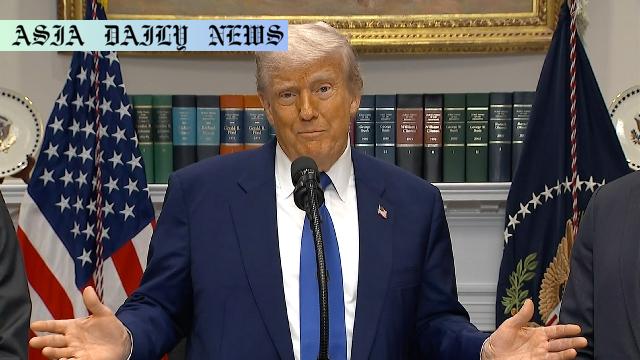Nippon Steel: Trump amends Biden’s block by permitting buyout under strict Treasury supervision.
Trump issued orders revising Biden’s block of Nippon Steel buying US Steel.
Orders allow acquisition if strict national security terms are met.
The US government gains a ‘golden share’ to oversee management decisions.
Nippon Steel and US Steel finalized agreement under Treasury’s watch.

Revisiting the Nippon Steel-US Steel Bid
In a significant reversal of prior national policy, US President Donald Trump has issued executive orders that revise former President Joe Biden’s decision to block the acquisition proposal by Nippon Steel to purchase US Steel. This controversial move follows an in-depth review conducted by the Committee on Foreign Investment in the United States (CFIUS). Trump’s decision demonstrates a pivot in national security considerations, emphasizing cooperation over restrictions.
The original decision by President Biden to block Nippon Steel’s buyout plan stemmed from heightened concerns that foreign ownership might compromise critical national assets. However, this policy shift occurred after Trump directed CFIUS in April to reassess the potential risks and benefits of the acquisition. The verdict reached by the committee concluded that any risks could be adequately mitigated under specific conditions. As such, this recalibration underscores a balancing act between fostering foreign direct investment and ensuring national security.
Conditions for Approval and Partnership Developments
The orders issued by Trump stipulate stringent conditions for the acquisition to move forward. Specifically, the deal is contingent upon Nippon Steel and US Steel entering into and adhering strictly to a national security agreement overseen by the US Treasury Department. The inclusion of such measures serves as a safeguard to prevent unforeseen threats. Substantial emphasis has also been placed on the introduction of a ‘golden share’ mechanism, granting the US government the authority to veto key management decisions, further embedding governmental oversight in the partnership.
Following the compliance mandate, Nippon Steel and US Steel jointly announced their agreement, marking a notable instance where business negotiations were steered and ultimately approved under strict governmental scrutiny. The ‘golden share’ provision not only adds a layer of protection for US interests but also sets a precedent for addressing similar security challenges in future transactions.
Implications for US Foreign Investment Policies
This decision is illustrative of a broader trend in reshaping US foreign investment frameworks. By leveraging executive orders, Trump showcased that trade and investment relationships can be reconfigured in ways that align with evolving geopolitical priorities. While the approval of Nippon Steel’s bid signifies progress in fostering international corporate partnerships, it also echoes a persistent call for vigilance and the prioritization of national interest over purely economic incentives.
Both supporters and critics are dissecting the implications of Trump’s decision. Advocates argue that the approval reflects pragmatism and adaptability in adjusting to modern global trade imperatives. Detractors, however, warn that such nuanced engagements might open doors to potential risk scenarios if executed without rigorous oversight and consistency. Nonetheless, the significance of allowing the acquisition while simultaneously respecting national security dynamics cannot be understated.
The Road Ahead for Strategic Partnerships
The announcement of this new collaboration should usher in a phase of innovation and strengthened bilateral ties between Japan and the United States. Nippon Steel’s proven track record in the global market, combined with stringent compliance directives issued by Trump, can set the stage for transformational industry advancements in steel production and beyond.
On the global stage, this move may serve as a case study for balancing international investments and national security. While Trump’s leadership in allowing this significant transaction has been met with mixed opinions, its long-term repercussions could redefine how international acquisitions are managed in the US, especially for sectors deemed critical to the country’s economy and security.
Commentary
A Pragmatic Approach to Economic Collaboration
Trump’s revision of Biden’s policy surrounding Nippon Steel’s bid for US Steel opens an engaging dialogue on the intersection of geopolitics, national security, and international business agreements. While economic protectionism has often been a go-to approach, Trump’s approval exhibits a case of strategic collaboration—demonstrating that when executed under rigorous conditions, foreign investments can align with national security.
New Precedents in the National Security Investment Framework
The inclusion of conditions like the national security agreement and the ‘golden share’ underscores a proactive strategy that ensures government oversight without completely hindering cross-border acquisitions. It is an intelligent compromise, facilitating investment while securing sensitive operations. This particular move should be seen as a framework for balancing security concerns with economic progress, setting a tensile equilibrium between caution and ambition.
Fostering Future Collaborations
Looking ahead, the decision to approve Nippon Steel’s acquisition could open avenues for fostering partnerships between nations with aligned economic interests. Japan’s role in this case is notably significant—symbolizing trust and bilateral synergy. However, this also highlights a need for governments to remain involved, a pertinent reminder of the importance of vigilance in safeguarding infrastructure critical to domestic and international stability. The approach here could well be a roadmap for navigating similar challenges in industries susceptible to national security risks.
Final Thoughts
While the jury may be out on the long-term success of Trump’s decision, it cannot be denied that this recalibration of policy has vast implications. By skillfully integrating foreign investments into America’s industrial framework under strict conditions, this move adds a nuanced layer to public policy—the capacity to engage in proactive measures while safeguarding sovereign interests.


